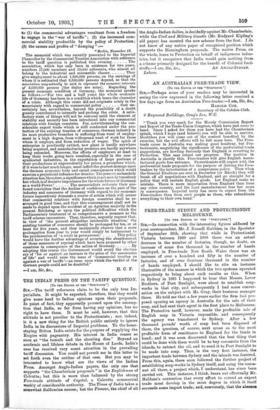THE INDIAN PRESS ON THE TARIFF QUESTION. [To THE EDITOR
OF TEE "SPECTATOR.") STR,—The tariff reformers claim to be the only true Im- perialists. It might be expected, therefore, that they would give some heed to Indian opinions upon their proposals. In point of fact, they apparently proceed upon the assump- tion that India, so far from having any opinions, has no right to have them. It must be said, however, that this attitude is not peculiar to the Protectionists ; nor, indeed, is it a new thing for the British public entirely to ignore India in its discussions of Imperial problems. To the home- staying Briton India exists for the purpose of supplying the Empire with pageantry. His interest in India ceases so soon as "the tumult and the shouting dies." Beyond an academic and lifeless debate in the House of Lords, India's case has received very scant attention in the prevailing tariff discussion. You could not permit me in this letter to set forth even the outline of that case. But you may be interested to know what are the views of the Indian Press. Amongst Anglo-Indian papers, the only one that supports "the Chamberlain proposals" is the Englishman of Calcutta; but this is more than balanced by the strong Free-trade attitude of Capital, a Calcutta commercial weekly of considerable authority. The Times of India takes a somewhat Balfourian course; but the Pioneer, the chief of all
the Anglo-Indian dailies, is decidedly against Mr. Chamberlain, while the Civil and Military Gazette (Mr. Rudyard Kipling's old paper) has scouted the new scheme from the first. I do not know of any native paper of recognised position which supports the Birmingham proposals. The native Press, on the whole, leans to Protection on behalf of indigenous indus- tries, but it recognises that India would gain nothing from a scheme primarily designed for the benefit of Colonial food-














































 Previous page
Previous page